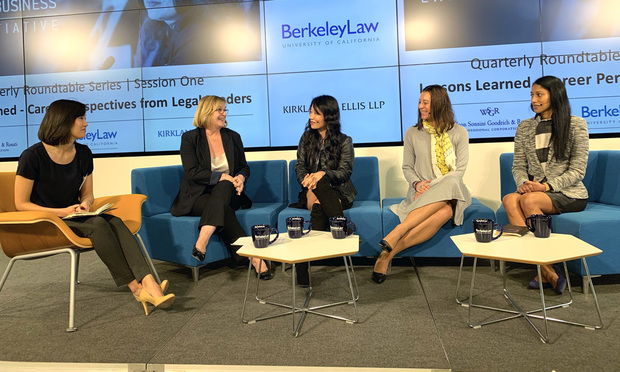Women Corporate Counsel Share Career Advice, Experiences At Berkeley Law Event
Women partners and general counsel convened for a panel Friday on gender equity in business law, offering career advice and their own stories.
March 15, 2019 at 06:59 PM
4 minute read
The original version of this story was published on The Recorder
 From left to right: Deborah Kang, the director of Startup@Berkeley Law; Katharine Martin, partner and chair of the board at Wilson Sonsini Goodrich & Rosati; Phuong Phillips, the chief legal office of Zynga; Samantha Good, a partner at Kirkland & Ellis; and Priya Pai, the incoming general counsel of Even Responsible Finance. Photo: Caroline Spiezio/ALM
From left to right: Deborah Kang, the director of Startup@Berkeley Law; Katharine Martin, partner and chair of the board at Wilson Sonsini Goodrich & Rosati; Phuong Phillips, the chief legal office of Zynga; Samantha Good, a partner at Kirkland & Ellis; and Priya Pai, the incoming general counsel of Even Responsible Finance. Photo: Caroline Spiezio/ALM
The Berkeley Center for Law and Business kicked off a series addressing gender inequity in business law with a panel of corporate counsel in San Francisco on Friday.
Phuong Phillips, the general counsel of gaming company Zynga; Priya Pai, the incoming general counsel of Even Responsible Finance; Samantha Good, a partner at Kirkland & Ellis; and Katharine Martin, a partner and chair of the board at Wilson Sonsini Goodrich & Rosati discussed women in business law on a panel hosted by Startup@Berkeley Law director Deborah Kang.
The lawyers discussed the challenges—and advantages—for women in business law. Good said there is a power that comes with being the only woman in the room: she stands out. Panelists said they have all been in that situation and found ways to thrive.
“My entire career I've always been the only woman in the room,” Phillips said, “The reason why I never felt intimidated: I saw myself as a peer to them. Gain the confidence. Gain the knowledge. Be prepared when you go into a meeting. And if that doesn't work, the other thing that has worked is, I'll find an advocate in the group.”
Pai also said she looks for advocates, and she does so by playing to her strengths. Instead of waiting to launch new ideas in the boardroom in a large groups, she bounces her proposals off of other executives in one-on-one meetings, where, she said, she's “more effective.”
That strategy allows her to grow her ideas in an authentic way. And, she said, it gives her an idea of how each executive will react to her idea when she brings it up in a larger meeting, as she's already discussed with them individually.
“I knew who was going to be behind it and who wasn't and how to address that,” she said. “So that comes back to, doing your homework and being being prepared, but also getting your advocates in the room.”
Advocates, sponsors and mentors also matter when women lawyers want to transition to a new role. Yet panelists said women are more likely to shy away from growing their networks, or tapping into the ones they have.
Martin said lawyers need to “figure out what we're the most comfortable with” when it comes to networking. All four panelists, and host Kang, said they've been overwhelmed by large networking events before. Phillips suggested lawyers looking to connect reach out via LinkedIn with a personal note after meeting in person; Martin said she often asks people to meet over lunch.
There are also ways to grow larger networking communities authentically, Pai said. She noted her friend began inviting women she met in fintech over for group dinners. In a small amount of time, the group has grown to more than 50 women in the industry.
“I think networking at that level, where it's actually more about friends and community, is really powerful,” Pai said.
Martin added women shouldn't be afraid to use those networks to develop business—the worst case scenario, she said, is someone politely says no.
Friday's session, titled “Lessons Learned: Career Perspectives from Legal Leaders,” was the first in a series hosted by The Women in Business Law Initiative at the Berkeley Center for Law and Business, which aims to address gender inequity in the legal industry. The initiative's next session June 7 will focus on addressing recruiting and integrating diverse talent.
Read More:
Solving Law's Diversity Challenge: Data and Small Firms
Study Shows 'Disheartening' Lack of Diversity at Legal Departments, Law Firms
This content has been archived. It is available through our partners, LexisNexis® and Bloomberg Law.
To view this content, please continue to their sites.
Not a Lexis Subscriber?
Subscribe Now
Not a Bloomberg Law Subscriber?
Subscribe Now
NOT FOR REPRINT
© 2025 ALM Global, LLC, All Rights Reserved. Request academic re-use from www.copyright.com. All other uses, submit a request to [email protected]. For more information visit Asset & Logo Licensing.
You Might Like
View All

Silicon Legal: Tech Companies Stand Up and Speak Out Against Texas Abortion Law


Trending Stories
- 1In-House Lawyers Are Focused on Employment and Cybersecurity Disputes, But Looking Out for Conflict Over AI
- 2A Simple 'Trial Lawyer' Goes to the Supreme Court
- 3Clifford Chance Adds Skadden Rainmaker in London
- 4Latham, Kirkland and Paul Weiss Climb UK M&A Rankings
- 5Goodwin Hires Quinn Emanuel Partner to Launch Office in Brussels
Who Got The Work
J. Brugh Lower of Gibbons has entered an appearance for industrial equipment supplier Devco Corporation in a pending trademark infringement lawsuit. The suit, accusing the defendant of selling knock-off Graco products, was filed Dec. 18 in New Jersey District Court by Rivkin Radler on behalf of Graco Inc. and Graco Minnesota. The case, assigned to U.S. District Judge Zahid N. Quraishi, is 3:24-cv-11294, Graco Inc. et al v. Devco Corporation.
Who Got The Work
Rebecca Maller-Stein and Kent A. Yalowitz of Arnold & Porter Kaye Scholer have entered their appearances for Hanaco Venture Capital and its executives, Lior Prosor and David Frankel, in a pending securities lawsuit. The action, filed on Dec. 24 in New York Southern District Court by Zell, Aron & Co. on behalf of Goldeneye Advisors, accuses the defendants of negligently and fraudulently managing the plaintiff's $1 million investment. The case, assigned to U.S. District Judge Vernon S. Broderick, is 1:24-cv-09918, Goldeneye Advisors, LLC v. Hanaco Venture Capital, Ltd. et al.
Who Got The Work
Attorneys from A&O Shearman has stepped in as defense counsel for Toronto-Dominion Bank and other defendants in a pending securities class action. The suit, filed Dec. 11 in New York Southern District Court by Bleichmar Fonti & Auld, accuses the defendants of concealing the bank's 'pervasive' deficiencies in regards to its compliance with the Bank Secrecy Act and the quality of its anti-money laundering controls. The case, assigned to U.S. District Judge Arun Subramanian, is 1:24-cv-09445, Gonzalez v. The Toronto-Dominion Bank et al.
Who Got The Work
Crown Castle International, a Pennsylvania company providing shared communications infrastructure, has turned to Luke D. Wolf of Gordon Rees Scully Mansukhani to fend off a pending breach-of-contract lawsuit. The court action, filed Nov. 25 in Michigan Eastern District Court by Hooper Hathaway PC on behalf of The Town Residences LLC, accuses Crown Castle of failing to transfer approximately $30,000 in utility payments from T-Mobile in breach of a roof-top lease and assignment agreement. The case, assigned to U.S. District Judge Susan K. Declercq, is 2:24-cv-13131, The Town Residences LLC v. T-Mobile US, Inc. et al.
Who Got The Work
Wilfred P. Coronato and Daniel M. Schwartz of McCarter & English have stepped in as defense counsel to Electrolux Home Products Inc. in a pending product liability lawsuit. The court action, filed Nov. 26 in New York Eastern District Court by Poulos Lopiccolo PC and Nagel Rice LLP on behalf of David Stern, alleges that the defendant's refrigerators’ drawers and shelving repeatedly break and fall apart within months after purchase. The case, assigned to U.S. District Judge Joan M. Azrack, is 2:24-cv-08204, Stern v. Electrolux Home Products, Inc.
Featured Firms
Law Offices of Gary Martin Hays & Associates, P.C.
(470) 294-1674
Law Offices of Mark E. Salomone
(857) 444-6468
Smith & Hassler
(713) 739-1250






